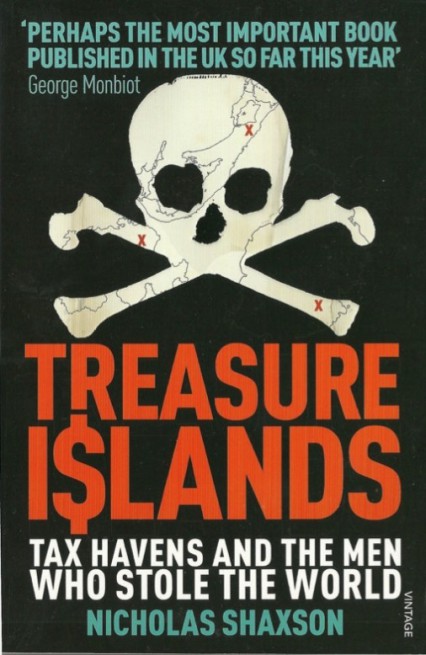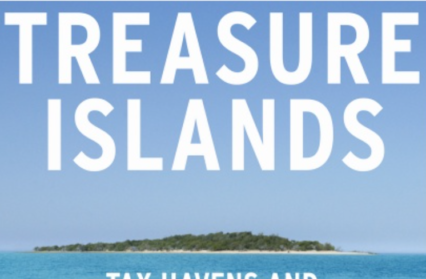Adam Somerset gives an in-depth review of the timely Treasure Islands: Tax Havens and the Men Who Stole the World by Nicholas Shaxson.
For decades the biggest building on the Pontarddulais road into Swansea was a heaving snack food factory. It went in 2005, to be integrated into another sizeable factory in England. We munch the company’s products by the tonne; watch the famous sportsman chirpily promoting the brand. But a great physical installation can have the lightest of corporate footprints on the actual soil of Britain. In 2009 all the ‘intellectual property’ and ‘business functions and risk’ went a-travelling and found a new home in Bern.
Nicholas Shaxson starts with the numbers. In 2010, by IMF estimates, a third of world GDP is to be found holed up in balance sheets on small island financial centres. This is not stuff on the fringe. Offshore plays centre stage in humanity’s financial world. When Enron fell it had 881 offshore subsidiaries, every one held incidentally in the remnants of the British Empire. Barclays in April 2009 had 315 tax haven subsidiaries.
It may not be the best season for the profession of journalism but Nicholas Shaxson is a reminder of what it can do, when it is minded to. Treasure Islands is persistent, clear, succinct, non-technical. And it is passionate as well. The Offshore world has its supporters. This July a parliamentarian has spoken of the citizen’s moral obligation to avoid tax. He speaks for UKIP and has the privilege to sit in the Lords.
Nicholas Shaxson explores the history of quite how the Offshore phenomenon came about. It is not just flight capital and kleptocracy. It had a kind of logic in its beginnings. A 1928 League of Nations treaty sought to mediate between obligations to host countries, where an asset performed an economic activity, and owner countries.

By Nicholas Shaxson
329pp, Vintage, £8.99
As the British dominions broke free, Offshore seemed a sensible solution for territories too small for independent viability. By the end of 1959 all the Anguillas and Grand Turks held deposits of a couple of hundred million, a minuscule percentage of Britain’s GDP. The Vietnam War played a part as government bonds skewed the US bond market; hence the Eurobond and the curious role of the Dutch Antillean islands. Aruba must have been the most unheard of teams that marched the Olympic circuit last month.
Nicholas Shaxson touches down on some of these territories that are British but totally non-British. For the arriving stranger they have a curiously flavourless feel. He gets closest to the Channel Islands, helped by former insiders who have gone public. A statistic reports that in a single quarter, in 2009, the City received net financing of $332bn from three tiddly islands.
Jersey’s history is summarised in an article from the Wall Street Journal. An insider from the 1990’s says that rates of tax ceased to apply. The wealthy, who sought residence, would send in lawyers to negotiate a flat sum. An economy has gone from boat-building and cod-fishing to global finance player but presided over ‘mostly by small-business owners and farmers…By and large they are totally out of their depth.’
Shaxson is a journalist with journalism’s eye for the sharp detail. Transfer pricing- that is, intra-company pricing between different subsidiaries, is a genuine accounting issue. But he locates the two thousand dollar litre of apple juice, the eight and a half thousand dollar ballpoint pen.
He cites estimates from South Korea that their neighbour’s Dear Leader has around four billion happily stashed away in Europe. He tracks the conceptual distinction between domicile and resident back to the Empire, originally a sensible way to treat an administrator who might spend decades in India. In 2006 the Sunday Times reported fifty-four billionaires living in Britain. Of the combined tax of £14.7m on £126bn of assets (i.e. £126,000,000m), two-thirds was paid by one man, James Dyson.
Llandovery High Street is home to a handsome bank branch, the very first of the Black Ox bank that was to mutate into Lloyds. Shaxson shows that this is the same organisation that picked up in January 2009 a $350m fine. The offence: masking Iranian and Sudanese money and channelling it into the US banking system. But of course these are the corporate titans who, like RBS, can give a gold card and ten thousand pounds of unsecured credit to a Monty Slater in Manchester. Little Monty is a shih-tzu dog.
The book does not go into technology. But multi-nationalism is no longer the province of giants. I have encountered a small services company with an owner resident in Portugal, because a partner wants a cheap, light-filled studio for painting. A software engineer lives in Russia, a couple of service people are in Cyprus and an accountant in Britain. That is the crux of it, that work can be borderless while tax jurisdictions are territorial. And what a strange bunch of contradictory jurisdictions they are.
It is a surprise to learn that Nevada, according to Shaxson, does not share tax or incorporation information with Federal authorities. The state does not require a company to report where it conducts its business. The Caymans’ company law is modelled on English law dating from 1862 but with some changes. Directors’ names, even a company charter, are not required. Had I ever thought about the International Accounting Standards Board I might have presumed it akin to the Law Society or the General Medical Council. Not so: it is a private company with a registration in Delaware.
The system is the system. The US president made note in a speech of a building in the Caribbean that is home to twelve thousand companies. It’s a minnow. ‘An office at 1209 North Orange Street, Wilmington’ writes Shaxson ‘houses the grand total of 217,000 companies’. FIFA owns a $200m HQ in Zurich but all the same South Africa had to place the 2010 World Cup in a special tax bubble. Limited liability partnerships are only twenty years old as a corporate form but they are here for good.
The system has its apologists. Many governments do have sticky fingers. As a mechanism for capital allocation they are far from perfect. But the £100bn load of dud loans that destroyed the Halifax does not suggest that private tsars get it right always either. Shaxson meets a libertarian of great personal charm. ‘I just work with theories’ he confesses ‘I have not worked in the real world of business.’ ‘Governments do not run countries, they parasitise them’ says a learned writer and scion of a wealthy landed dynasty.
Shaxson makes the obvious rebuttals. Loose, unregulated money, far from being a rational allocation model, is more a part of instability. Even back in the 1960’s he cites a US Treasury Under-secretary who has concerns. The Bank of England is not worried, at least publicly. But an internal memo reads, ‘I did get the impression some of them were rather keeping their fingers crossed’. And, of course a government’s revenue-gathering capability correlates with prosperity. Business may not spark in Italy’s anti-start-up environment, but business quite favours decent infrastructure and a good public education system.
If Treasure Islands is due for a new edition there is plenty to add. A new report, ‘The Price of Offshore Revisited’, commissioned by the campaign group Tax Justice Network, states that offshore funds are £13 trillion. That is the American and Japanese GDPs put together. July 17th the US Senate published their 335-page report on the tidal wave of drug money and worse swilling through a bank with a cosy branch on every British high street. The world’s most famous football team is currently reconfiguring itself for the Caribbean. In what must be a classic of the moneymen’s disdain for language it has acquired a tax-light status of ’emerging growth company’- at one hundred and thirty-four years of age that gives the term ’emerging’ a whole new meaning.
On June 28th Jersey’s assistant chief minister made threats of going it alone. History is not promising. When the Bahamas went independent the money of no fixed abode packed its suitcases and left. The Empire reassures; says a former Senator, ‘There is a kind of tatty credibility that clings to the public administration here, which comes from operating under the skirts of the establishment in London’.
There is a lot in Treasure Islands and much left out. Nicholas Shaxson gives a neat summary of our libel laws; no constitutional protection of free speech, no higher public interest defence, the costs of libel litigation running at one hundred and forty times the average in Europe. The world adores London.
But who is it all really for? Plain folk would run a mile from that chilly block that overlooks Hyde Park with its £136m Ukrainian-owned penthouse. Nicholas Shaxson reports on the private equity tycoon who does not want his tax exile status sullied by seeing his family who live in a real country. Asset-soaked Jersey can do without such flim flam as a national health service. In a sleek office by Albany in Piccadilly I once spent an intriguing hour with an adviser to a clan with assets in the $7bn-$8bn range. ‘You have to understand’ he said ‘They are obsessed, by fear, fear of losing it.’
Treasure Islands was published by Penguin Random House in 2011.
Adam Somerset is an essayist and a regular contributor to Wales Arts Review.











